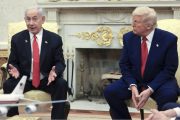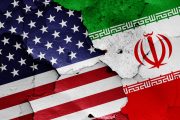
In a letter sent secretly to Iran’s Supreme Leader Ayatollah Ali Khamenei last month, President Obama maintained that the two nations shared a common interest in fighting Islamic State militants (known as ISIS or ISIL) in Iraq and Syria.
The story was broken by the Wall Street Journal, which attributed information about the letter to unnamed “people briefed on the correspondence.”
The president’s letter to Khamenei was a mixed bag, according to the report. While advocating that Iran cooperate with the United States in military action against ISIS it also insisted that such cooperation was contingent on Iran reaching a comprehensive agreement with global powers on the future of Tehran’s nuclear program by a November 24 diplomatic deadline.
The deadline mentioned by the Journal was one of two related to Iran’s disclosure of information about its nuclear fuel program. Iran agreed in May to provide the International Atomic Energy Agency (IAEA) with information on two (out of about a dozen) areas related to its nuclear fuel enrichment program that the UN agency regards as “suspicious” by August 25.
Under the second, Iran and the six world powers (called the P5+1) involved in the negotiations (the United States, Russia, China, Britain, France, and Germany) sought to reach a separate deal on Iran’s uranium enrichment facilities by November 24.
A November 7 report from AFP cited a statement from IAEA that Iran and the IAEA have agreed to a “technical meeting to further discuss the two outstanding practical measures … but not before November 24.”
AFP cited a statement from the U.S. envoy to the IAEA, Laura Kennedy, who said in September that the UN agency’s allegations “must be addressed as part of any comprehensive” wider deal between Iran and world powers.
“Only when this happens will it be possible to have confidence that Iran’s nuclear program is and will remain exclusively peaceful,” Kennedy told reporters.
Iran has attempted to mollify Western concerns about its nuclear program in order to obtain relief from sanctions imposed on it.
Statements posted on the U.S. Department of the Treasury website note that on May 1, 2012, President Obama signed Executive Order 13608, “Prohibiting Certain Transactions With and Suspending Entry Into the United States of Foreign Sanctions Evaders With Respect to Iran and Syria.” However, as a result of the ongoing negotiations, on July 19, 2014, the P5+1 nations (coordinated by EU High Representative Catherine Ashton) and Iran affirmed that they will continue to implement the commitments described in the Joint Plan of Action (JPOA) and the U.S. government has extended through November 24, 2014, the sanctions relief provided for in the JPOA. (Among the temporary relief from the sanctions authorized by the JPOA were exports of petroleum from Iran and imports of aircraft parts deemed to be essential to Iranian air traffic safety.) The sanctions prohibit the sale or export of a number of goods, technology, or services from the United States to Iran, as well as the import of goods and services from Iran.
During a November 6 White House press briefing, Julie Pace, AP’s White House correspondent, asked Press Secretary Josh Earnest to confirm that Obama sent the letter reported by the Journal to Iran’s Supreme Leader.
Earnest dodged the question, stating:
I’m not in a position to discuss private correspondence between the President and any world leader. I can tell you that the policy that the President and his administration have articulated about Iran remains unchanged. The United States is engaged in conversations with Iran in the context of the P5-plus-1 talks to resolve the international community’s concerns about Iran’s nuclear program, and we have also discussed on the sidelines of those talks on at least a couple of occasions the ongoing campaign that is being conducted against ISIL by the United States and 60 members of — or now more than 60 members who are part of this broader coalition.
Pace also asked Earnest about Obama’s stated intention to work with Congress to obtain a new AUMF (Authorization for Use of Military Force) to continue our campaign against ISIS.
Earnest said that the president believes that he already has such authorization, based on the 2001 Authorization for Use of Military Force. When Pace asked if, in the event that Congress cannot come to an agreement with the president about a new AUMF, he would still forward with this mission against ISIS, Earnest replied, “That’s correct, because Congress has already given him this authority in 2001 when they passed the Authorization to Use Military Force that year.”
The White House apparently regards the 2001 AUMF as a blank check to go to war, with no expiration date.
Ed Henry, the senior White House correspondent for the Fox News Channel, revisited the topic by noting that Obama’s letter (which Earnest did not even acknowledge was ever sent) “was allegedly written in part to bring Iran in to help fight ISIS, beyond the nuclear deal.” Henry asked that — in light of the fact that Iran’s President Rouhani said in an interview that he thinks the airstrikes so far against ISIS have been a form of theater and not a serious campaign against terrorists —how can the president believe that Iran is a credible partner.
Earnest replied that, although Rouhani’s statement wasn’t true, Iran still has a stake in the game:
There’s a pretty clear interest that Iran has in this fight against ISIL [ISIS]. It’s not in the interest of Iran or, frankly, anybody else in this region of the world to have this extremist group rampaging across the countryside carrying out terrible acts of violence.
… Because of Iran’s relationship with the rest of the world, for a variety of reasons, it’s difficult for the United States to work very closely with Iran in this endeavor. That’s why we’re not cooperating with them militarily; we’re not sharing intelligence with them. But we do seek to … engage them on the sidelines of other talks to make sure that they understand what we’re trying to do here and to get a sense about their perspective on things.
In a joint statement, two critics of Obama’s foreign policy, Senators John McCain (R-Ariz.) and Lindsey Graham (R-S.C.), called it “outrageous” that the president would seek to enlist Iran in its fight against ISIS in light of Iran’s support for Syrian President Assad and Shia extremists throughout the region.
“The consequences of this ill-conceived bargain would destroy the Syrians’ last, best chance to live in freedom from the brutal Assad regime,” said the senators.
Another senator who is considerably less interventionist than McCain and Graham, Senator Rand Paul (R-Ky.), who was obviously aware of the connection between the anti-Assad rebels and the al-Qaeda-linked ISIS, made a statement on May 21, 2013, directed at his colleagues, nearly all of whom voted to send arms to Syrian rebels: “This is an important moment. You will be funding, today, the allies of al-Qaeda.”
Now, apparently, the Obama administration seems willing to invite Iran into the fight against those same allies of al-Qaeda.
The main arguments between Obama and the more hawk-like Republicans in Congress are based not on whether we should intervene in the Middle East, but on which bad guys are worse than others, and which bad guys are not-so-bad guys that we should help. This is the sort of thinking that has involved American forces in the region since the firs Gulf War in 1991.
A better solution might be to let the bad guys fight each other until none of them is left standing. That almost happened during the Iraq-Iran war from 1980-1988.
Photo of President Barack Obama: AP Images
Related articles
Iran’s Revolutionary Guards Fighting ISIS in Iraq
Iran Attacks Obama Spin on “Historic Deal”; Critics Express Alarm
Israel and U.S. Spar Over Iran Nuclear Program
Iran Nuke Threat Not Imminent, Officials Say
UN Votes for Sanctions Against Iran
G8 Pushes Iran Sanctions, Meets Resistance
UN Nuke Chief in Secret Talks With Iran
Al-Qaeda Splinter Group’s Insurgents Overrun Mosul, Iraq
Iran to Sell Arms and Ammunition to Iraq
“New Iraq” Not So Free for Non-Muslims




